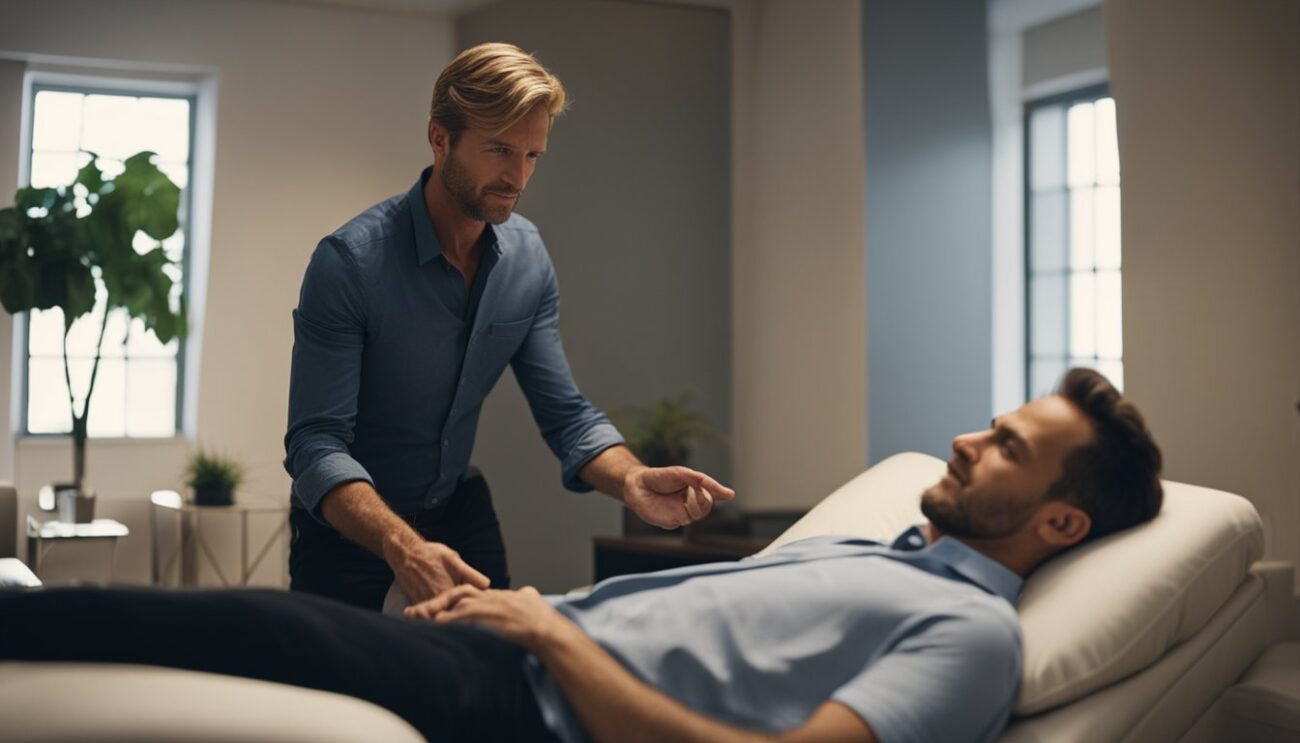Erectile dysfunction (ED) can be a frustrating and sensitive issue, but there’s hope with alternative treatments like hypnosis. Hypnosis has shown promise in helping to address the psychological aspects of ED, providing a unique and holistic approach to treatment. By focusing on releasing mental blocks and reducing anxiety, hypnotherapy can help improve your sexual performance.
Using hypnosis for ED involves techniques that help you relax and reframe negative thoughts that might interfere with your sexual function. As the brain plays a significant role in creating an erection, addressing these mental hurdles can pave the way for better results. The process typically includes guided imagery and positive affirmations to build confidence and enhance physical response.
For those looking for a non-invasive treatment, hypnosis might be a worthwhile option. It’s been used to manage a variety of sexual issues, from reduced libido to anorgasmia. If you’re curious about trying hypnosis for ED, learning more about its benefits and methods could be the first step towards improving your intimate life.
Understanding Erectile Dysfunction

Erectile Dysfunction can be caused by both physical and psychological factors. Knowing about both can help you understand the underlying issues and seek the appropriate treatment.
Physical Causes of ED
Several health conditions can affect your ability to maintain an erection. Blood flow is crucial for achieving an erection, so problems with your heart and blood vessels can lead to ED. Cardiovascular disease is a common culprit.
Another significant factor is diabetes, which can damage nerves and blood vessels. High blood pressure can also contribute by affecting blood vessel health. Aging naturally increases the risk, as older men might experience changes in blood vessel function.
Psychological Factors in ED
Psychological issues play a big role in ED. Stress and anxiety can interfere with your brain’s ability to send the necessary signals for an erection. Depression can also reduce your interest and excitement in sexual activities, leading to ED.
Relationship problems can be a major factor too. If there’s tension, lack of communication, or unresolved conflicts with your partner, it might affect your sexual performance. Addressing these psychological causes with therapy, including techniques like hypnosis, can be very effective.
An Overview of Hypnosis

Hypnosis is a therapeutic technique used to help manage various conditions by focusing and relaxing the mind. This section covers the basics of hypnotherapy and self-hypnosis techniques that you can practice for personal benefits.
The Basics of Hypnotherapy
Hypnosis involves guiding you into a state of deep relaxation. This can help you become more open to positive suggestions from the therapist. During a session, you might focus on specific thoughts or images, known as visualization.
The goal is to reach a state where your mind is more receptive to change. For instance, using a relaxation technique can calm anxiety, which may aid in managing issues like erectile dysfunction. Hypnotherapy is often customized to address your particular needs and concerns.
Suggestions made during hypnosis aim to influence your subconscious mind. These suggestions can help you overcome mental barriers and enhance your overall well-being. Hypnotherapy is safe and non-invasive, making it an attractive option for many.
Self-Hypnosis Techniques
Self-hypnosis allows you to practice hypnosis on your own. This method involves entering a relaxed, focused state where you give yourself positive suggestions. A common self-hypnosis technique involves deep breathing and mental visualization.
Start by finding a quiet place where you won’t be disturbed. Sit or lie down comfortably and close your eyes. Take deep breaths, focusing on the rhythm of your breathing. Visualize a peaceful scene, like a beach or a forest, to help deepen your relaxation.
Once relaxed, silently repeat positive affirmations to yourself. These might include statements like, “I am confident,” or “I can overcome my challenges.” Practicing self-hypnosis regularly can help reinforce these positive messages in your mind.
Self-hypnosis is a valuable tool for managing stress and anxiety. It empowers you to take control of your mental state and fosters a sense of well-being.
Erectile Dysfunction and Mental Health

Erectile dysfunction often has connections to mental health. Key factors like stress and anxiety can impact your ability to achieve and maintain an erection.
Impact of Stress and Anxiety
Stress and anxiety play significant roles in ED. Everyday pressures from work, family, or finances can cause stress, affecting your sexual health. Anxiety about sexual performance, known as performance anxiety, can also contribute. When you worry about whether you can perform, it can prevent you from maintaining an erection.
Long-term stress and anxiety can lead to more severe issues like depression. Depression often lowers your libido, making it harder to feel aroused. It’s important to address these mental health issues, as they not only affect your sexual health but your overall well-being.
Psychological Barriers to Arousal
Various psychological factors can act as barriers to arousal. Negative thinking patterns, such as doubting your self-worth or feeling guilty about sexual desires, can inhibit your ability to become aroused. Low self-esteem is another major factor; when you don’t feel good about yourself, it’s challenging to get in the mood for sex.
Relationship problems can add another layer of complexity. If you are experiencing conflict or lack of communication with your partner, it may affect your sexual performance. Recognizing and addressing these psychological barriers can help improve not just your sexual health but also your mental well-being.

Hypnosis as a Treatment for ED
Hypnosis offers a holistic approach to managing erectile dysfunction by targeting the mental and emotional aspects that often contribute to the condition. Here, we will explore how effective hypnosis can be and how it compares to other common treatments like medication and psychotherapy.
Effectiveness of Hypnosis for ED
Hypnosis focuses on the mind-body connection. It aims to reduce mental “blocks” that might hinder your sexual performance. By using guided relaxation and focused concentration, hypnosis helps foster a positive mindset. This can be really important if stress or anxiety is preventing you from achieving an erection.
Anecdotal evidence suggests that many men find relief through hypnotherapy. Some report improved confidence and better performance. While scientific studies are limited, those that do exist show promising results. For example, some small studies indicate that hypnosis can help some men maintain an erection without the need for medication.
Although not a cure-all, hypnosis can be a useful tool. It’s important to combine it with other treatments for the best outcome. Hypnotherapy can be complementary when paired with other therapies like sex therapy or psychotherapy.

Comparing Hypnosis to Other Treatments
When comparing hypnosis to other treatments, you should consider different factors. Medications like Viagra are widely used and effective for many men. They work quickly and can be easily accessed. However, these drugs often only treat the symptoms and not the underlying causes of ED.
On the other hand, psychotherapy and sex therapy target emotional and psychological issues, like stress and anxiety. These therapies can be very effective, especially for ED caused by psychological factors.
Hypnosis brings a unique advantage by blending mental relaxation with positive reinforcement. Unlike medication, it aims to address mental blocks directly. While it’s not as quick-acting as pills, the benefits of hypnotherapy can be long-lasting and free of side effects.
Choosing the right treatment depends on your specific needs and the root cause of your ED. Often, a combination of treatments provides the best results.
Building Intimacy and Confidence

Using hypnosis to cure erectile dysfunction can help you in strengthening relationships with your partner and improving your self-confidence in intimate settings. Both aspects are crucial to overcoming challenges related to intimacy and performance.
Strengthening Partner Relationships
Strengthening your relationship with your partner plays a vital role in addressing erectile dysfunction. Hypnosis can help you and your partner communicate better, breaking down barriers caused by negative sexual experiences. It’s important to be open about your feelings and concerns. This can lead to greater intimacy and understanding, which are essential for a healthy sexual relationship.
A strong relationship can create a supportive environment where both partners work together to tackle issues. This collaboration can improve your self-esteem and strengthen your emotional bond, often leading to higher libido and better performance. Trust and empathy grow as you and your partner learn to navigate these challenges together.
Improving Self-Confidence in Intimate Settings
Self-confidence is key when dealing with erectile dysfunction. Hypnosis often involves positive reinforcement and visualization techniques that boost your confidence in intimate situations. This can significantly reduce anxiety and fear, which are common causes of performance issues.
As you gain self-confidence, you’ll likely see improvements in your sexual performance. This positive cycle can alleviate the lack of intimacy, leading to a more satisfying experience for both you and your partner. Practicing these techniques regularly can help you maintain a positive mindset and further enhance your intimate life.
Incorporating hypnosis into your routine could be an effective way to build both intimacy and self-confidence, ultimately creating a better and more fulfilling relationship.
Alternative and Complementary Therapies

There are various alternative and complementary therapies that can help manage erectile dysfunction (ED). These therapies often involve both physical and psychological approaches to treat this condition.
Exploring Sex Therapy and Counseling
Sex therapy and counseling can be very effective in treating ED, especially when psychological factors like stress, anxiety, or relationship issues are involved. A specialist, such as a certified sex therapist, can guide you through sessions to address these underlying issues.
What to Expect:
- Talking openly about your sexual history and concerns.
- Learning techniques to reduce anxiety and improve sexual function.
- Building better communication with your partner.
In addition to counseling, psychotherapy may also be suggested. This involves longer-term strategies to improve mental health, which can indirectly improve sexual health. Talking to a psychologist or mental health professional may help you uncover deep-seated issues contributing to ED.

Role of Alternative Medicine in Treating ED
Alternative medicine offers various treatments that some people find helpful in managing ED. Herbs like ginkgo biloba and ginseng are frequently mentioned for their potential benefits. Detailed studies and systematic reviews discuss how these remedies can be part of a treatment plan.
Popular Options:
- Herbal Supplements: Ginkgo biloba and ginseng are believed to improve blood flow.
- Acupuncture: Some people report increased sexual function after acupuncture sessions. Studies, such as those found here, show potential benefits.
- Yoga and Meditation: These practices help reduce stress and improve overall wellness.
While these methods don’t replace traditional treatments like medication or surgery, they can support lifestyle changes that contribute to managing ED. Always consult with a healthcare provider before starting any alternative treatments to ensure they are safe and appropriate for you.
Managing Psychological Challenges

Hypnosis can help manage psychological barriers to improve erectile dysfunction. These barriers often include performance anxiety and emotions like guilt or shame.
Dealing With Performance Anxiety
Performance anxiety is a common psychological issue linked to erectile dysfunction. The pressure to perform can create a cycle of stress and failure, making the situation worse. Through hypnosis, you can learn to relax and focus on positive thoughts.
Hypnosis helps by:
- Teaching relaxation techniques
- Reframing negative thoughts
- Building confidence in your abilities
You might practice imagining successful and pleasurable experiences. This mental practice can reduce anxiety and help you feel more at ease during intimate moments. With continued use, hypnosis can lower your stress levels and give you the calm needed to manage performance anxiety effectively.
Overcoming Guilt and Shame
Feelings of guilt and shame can deeply affect your sexual health. These emotions might stem from past experiences or societal pressures. Hypnosis can help you process these feelings and build a healthier self-image.
Hypnosis can guide you to:
- Understand the root of your emotions
- Replace negative self-talk with positive affirmations
- Visualize yourself overcoming these feelings
For instance, if you feel guilty about not satisfying your partner, hypnosis can help you focus on open communication and understanding. Working on these aspects can not only improve erectile function but also strengthen your relationships. The process encourages self-compassion and helps you move past these debilitating emotions.
Taking Control: Self-Managed Care

Self-managed care involves techniques that can help you address erectile dysfunction by focusing on stress reduction and mental well-being. By practicing self-hypnosis and incorporating relaxation techniques, you can improve your confidence and attention, which are key elements in managing erectile dysfunction.
Self-Hypnosis for Daily Stress Management
Self-hypnosis is a tool you can use to manage daily stress and take control of your mental state. This technique allows you to access a relaxed, focused state where you can suggest positive affirmations to yourself.
To start, find a quiet space where you won’t be disturbed. Close your eyes and take deep breaths, focusing on your breathing. Imagine a peaceful scene, like a beach or forest. As you relax, repeat affirmations like “I am confident” or “I am in control.”
Practice this regularly to reduce stress levels and boost your self-confidence. By managing daily stress, you can improve your overall mental health, which in turn can positively impact your sexual health.
Incorporating Relaxation Techniques
Incorporating relaxation techniques into your routine can help manage stress and improve your mental well-being. Techniques such as deep breathing, progressive muscle relaxation, and guided imagery can be highly effective.
Deep Breathing: Sit or lie down in a comfortable position. Inhale deeply through your nose, hold for a few seconds, and exhale slowly through your mouth. Repeat this for several minutes.
Progressive Muscle Relaxation: Tense and then slowly relax different muscle groups, starting from your toes and working up to your head. This can help release physical tension and calm your mind.
Guided Imagery: Listen to audio recordings that guide you through visualizing peaceful scenes. This can help redirect your attention away from stress and towards a calm state.
Using these techniques can help lower stress levels, which is crucial for managing erectile dysfunction. Regular practice can lead to better control of your body and mind, improving both your self-confidence and attention in daily life.
Erectile Dysfunction Through the Ages
Erectile dysfunction (ED) affects people differently depending on their age. Key factors like hormone levels and psychological health play important roles.
Addressing ED in Teenagers
Teenagers may experience ED due to stress, anxiety, or hormonal imbalances. Performance anxiety and stress from school or social pressures can contribute to ED. It’s common for young people to feel embarrassed about this issue, making it difficult to talk about.
Hormonal changes during puberty can impact sexual activity. Ensuring emotional support and educating teenagers about healthy habits can help manage ED. It’s essential for you to seek professional help if the problem persists, as early intervention can prevent long-term issues.
Challenges of ED in Older Adults

As you age, the likelihood of experiencing ED increases due to physical and psychological factors. Conditions like high blood pressure, diabetes, and cardiovascular disease impact your ability to maintain erections. Medications for these conditions can also contribute to ED.
Aging affects hormone levels, particularly testosterone, which can lower sexual activity and desire. Psychological factors like depression or relationship issues can further complicate matters. Open communication with your partner and healthcare provider can help manage and treat ED effectively. Lifestyle changes, such as regular exercise and a healthy diet, can also make a significant difference in alleviating symptoms.
For more information on how ED impacts different age groups, you can visit this detailed article or learn about psychogenic ED for psychological factors contributing to ED.
Frequently Asked Questions

Hypnosis is being looked at as a potential way to help with erectile dysfunction. Below are answers to some common questions about using hypnosis for ED.
Is hypnotherapy a proven method for improving sexual performance?
While research is still ongoing, some studies suggest that hypnotherapy can help improve sexual performance by addressing mental blocks and reducing anxiety. Techniques focus on connecting the mind and body to enhance sexual function. However, more scientific evidence is needed to establish its effectiveness fully.
How does self-hypnosis compare to other treatments for ED?
Self-hypnosis can be a useful tool, especially when combined with other treatments like medication or lifestyle changes. It helps manage stress and improve mental focus. However, it may not be as rapid or extensive in its effects compared to prescribed medications or surgical options.
Where can I find a hypnotherapist who specializes in treating erectile dysfunction?
You can search for a specialized hypnotherapist through professional organizations or directories. Some notable resources include the American Society of Clinical Hypnosis and local health service providers. Ensure the hypnotist has experience specifically with erectile dysfunction cases.
Are there guided meditations that can help with erectile dysfunction symptoms?
Yes, there are various guided meditations available to help alleviate symptoms of erectile dysfunction. These meditations focus on reducing anxiety, improving self-confidence, and promoting relaxation. Many can be found online or through health and wellness apps.
What are the success rates for using hypnosis to treat ED?
Success rates for hypnotherapy in treating erectile dysfunction can vary. Some people report significant improvements, while others may experience minimal effects. It’s important to have realistic expectations and consider it as an adjunct, rather than a substitute, for other treatments.
Can changes in one’s mental state through hypnosis affect erectile dysfunction?
Yes, changes in mental state achieved through hypnosis can affect erectile dysfunction. By addressing psychological factors like stress, anxiety, and negative self-talk, hypnosis can potentially improve ED symptoms. The mind-body connection plays a critical role in sexual health.
n conclusion, the exploration of hypnosis as a therapeutic intervention for erectile dysfunction offers a promising and holistic approach to addressing this deeply personal and often distressing condition. While traditional medical treatments such as pharmacotherapy and surgery have their place and effectiveness, hypnosis provides an alternative or complementary pathway that delves into the psychological and emotional dimensions of sexual health.
The efficacy of hypnosis in treating ED hinges on its ability to tap into the subconscious mind, where many of the root causes of sexual dysfunction may reside. By addressing issues such as anxiety, stress, self-esteem, and past traumas, hypnosis can help individuals reframe their thoughts and reactions in a more positive and constructive manner. This mental and emotional recalibration can lead to improved sexual performance and satisfaction, fostering a healthier and more fulfilling intimate life.
Moreover, hypnosis is a non-invasive and drug-free option, which can be particularly appealing to those who prefer to avoid the potential side effects and risks associated with medications. It also encourages individuals to take an active role in their healing process, promoting a sense of empowerment and self-efficacy that can extend beyond the realm of sexual health to other areas of life.
However, it is important to acknowledge that hypnosis may not be a one-size-fits-all solution. The success of hypnotherapy can vary depending on the individual’s openness to the process, the skill and experience of the hypnotherapist, and the underlying causes of the erectile dysfunction. Therefore, it is crucial for individuals considering this treatment to consult with qualified healthcare professionals and certified hypnotherapists to ensure a comprehensive and tailored approach to their condition.
In addition, more rigorous scientific research is needed to further validate the effectiveness of hypnosis for ED and to establish standardized protocols for its application. Continued studies and clinical trials will help to solidify the role of hypnosis in the broader landscape of sexual health treatments and provide clearer guidelines for practitioners and patients alike.
Ultimately, the integration of hypnosis into the therapeutic arsenal for erectile dysfunction represents a step towards a more holistic and patient-centered approach to healthcare. By acknowledging and addressing the intricate interplay between mind and body, hypnosis has the potential to not only alleviate the symptoms of ED but also to enhance overall well-being and quality of life. As awareness and acceptance of hypnotherapy grow, it is hoped that more individuals will have access to this valuable tool, enabling them to overcome the challenges of erectile dysfunction and reclaim their sexual health with confidence and dignity.




